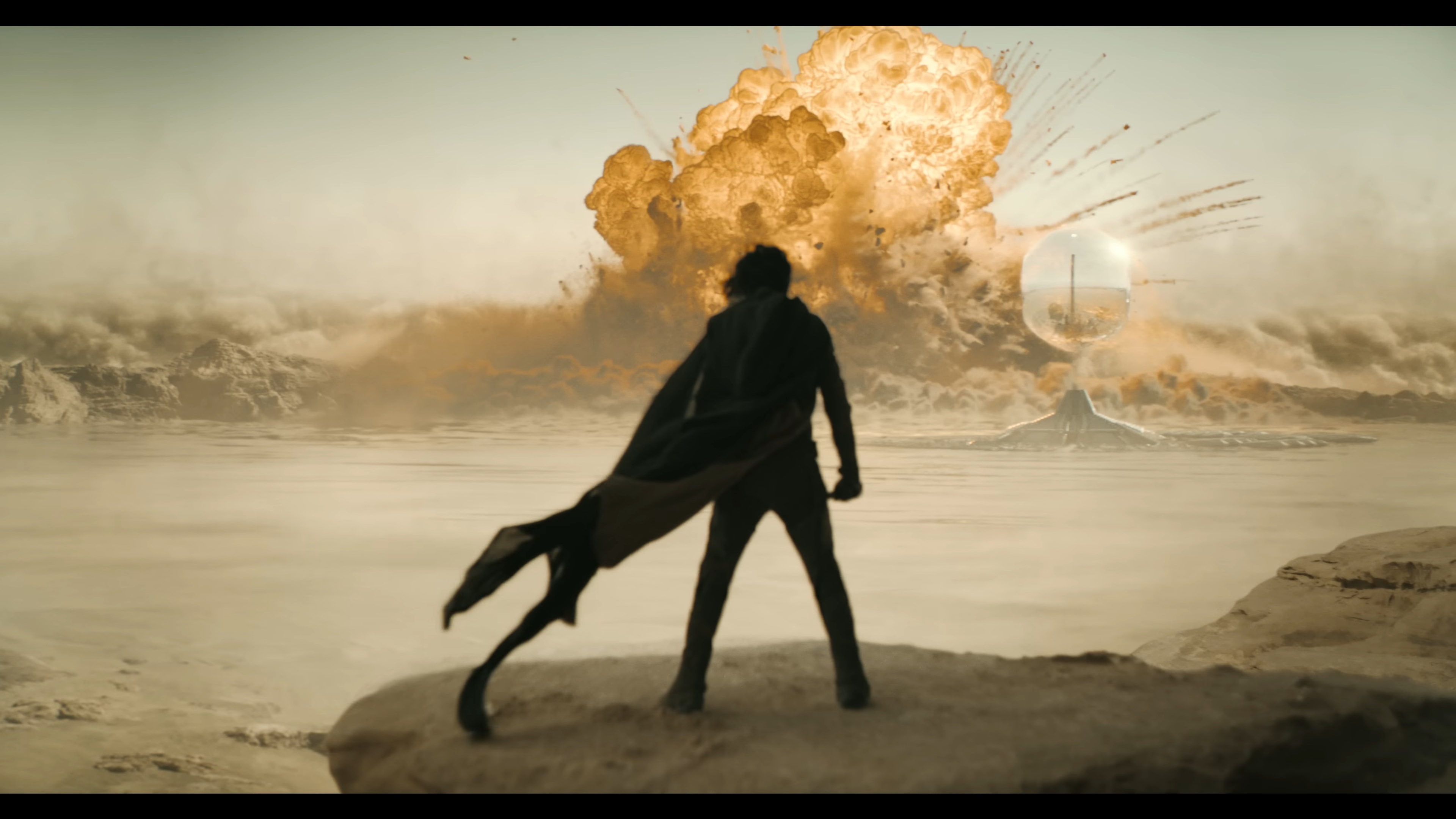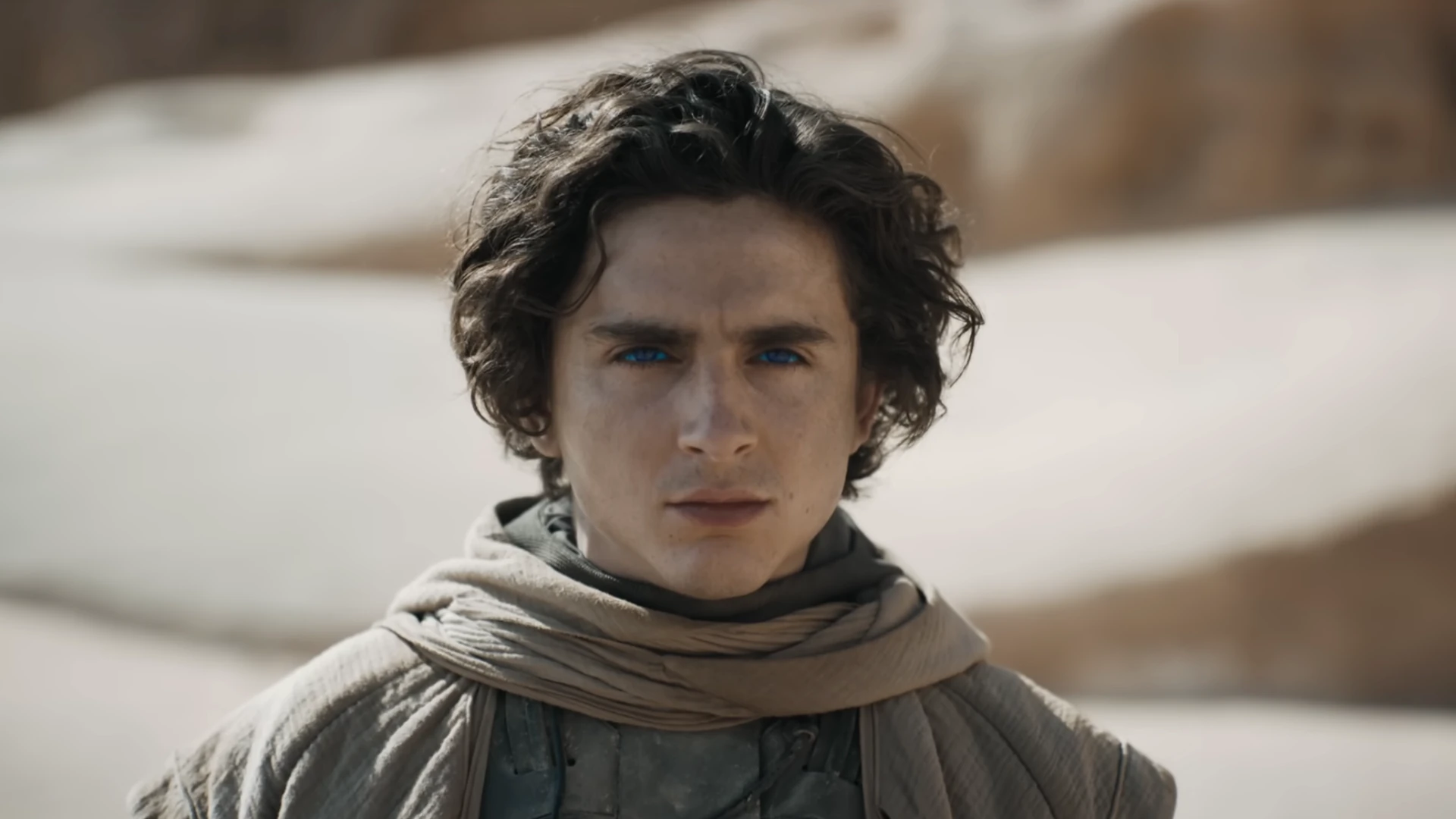The sands of Arrakis are shifting once again, and this time, a new face might be joining the battle for the universe—literally. Robert Pattinson is reportedly in early negotiations to join Denis Villeneuve’s Dune: Part Three as Scytale, the mysterious shape-shifting Face Dancer from the Bene Tleilax. If confirmed, Pattinson’s role could introduce one of the saga’s most complex and deceptive villains, adding a chilling edge to the final installment in Villeneuve’s epic sci-fi trilogy.
Villeneuve’s Final Chapter Begins to Take Shape
Following the massive critical and commercial success of Dune: Part Two—which surpassed $714 million at the global box office—Legendary Pictures and Warner Bros. have given the green light to Dune: Part Three, an adaptation of Frank Herbert’s Dune Messiah. With production expected to begin in mid-2025 and a tentative release date set for December 18, 2026, Villeneuve is poised to bring his cinematic vision of Paul Atreides’ story to a definitive close.

Villeneuve has described Dune Messiah as “a more intimate and political” film compared to the grand battles of its predecessors. It’s a book that dismantles the myth of Paul Muad’Dib, exploring the cost of messianic power, the manipulations of religious fervor, and the devastating consequences of a galactic jihad carried out in Paul’s name.
Who Is Scytale – And Why Pattinson Is a Perfect Fit
Scytale isn’t your typical villain. He’s a Face Dancer—an artificial being capable of mimicking other people’s appearance and behavior with uncanny precision. Created by the secretive and morally ambiguous Bene Tleilax, Scytale operates as part of a conspiracy to destabilize Paul’s empire. His role in Dune Messiah is pivotal, involving deception, genetic engineering, and philosophical confrontations about identity and destiny.
Pattinson, known for disappearing into complex roles (The Lighthouse, Tenet, Good Time), could bring a level of nuance and unpredictability that Scytale demands. While negotiations are ongoing and no official confirmation has been made, fan speculation has already taken off online, with many citing Pattinson’s range and intensity as a perfect match for the character’s eerie charisma and existential undertones.
Returning Stars and Newcomers
Much of the core cast from Dune: Part Two is expected to return:
- Timothée Chalamet as Paul Atreides
- Zendaya as Chani
- Rebecca Ferguson as Lady Jessica
- Josh Brolin as Gurney Halleck
- Florence Pugh as Princess Irulan
- Christopher Walken as Emperor Shaddam IV
- Javier Bardem as Stilgar
- Anya Taylor-Joy as Alia Atreides
- Léa Seydoux as Lady Margot Fenring
In a surprise reveal, Jason Momoa has confirmed his return as Duncan Idaho. Though his character died in the first film, Dune Messiah introduces a resurrected version of Duncan—known as a ghola, created by the Bene Tleilax—as a key figure in Paul’s personal and political turmoil. Villeneuve has stated that Florence Pugh and Anya Taylor-Joy will have expanded roles, aligning with their characters’ increased prominence in the source material.
Dune 3 Release Date
“Dune 3: Messiah” is set to be released in theaters on December 16, 2026. In the meantime, fans of the Dune franchise can look forward to exploring Frank Herbert’s dystopian universe through the series “Dune: Prophecy,” which was released November 17, 2024 on Max. This series focuses on the Bene Gesserit clan and serves as a prequel to Denis Villeneuve’s films.
Additionally, “Dune: Part Two” is currently streaming on Netflix and available for purchase on Prime Video, iTunes, Microsoft Store, and other platforms.
The Themes of Dune: Messiah – Power, Faith, and Fate
Unlike the rise-and-revenge arc of the first two films, Dune: Part Three will confront Paul with the burdens of power. He’s no longer the underdog messiah—he’s the most powerful man in the galaxy, worshipped as a god by billions. But the cost of this power is immense. Haunted by prescient visions of a galaxy-consuming war, Paul faces impossible choices: Can he alter destiny without destroying the future?
Scytale, as part of a broader conspiracy involving the Bene Gesserit, Spacing Guild, and Tleilaxu, will serve as a key player in challenging Paul’s rule—not through brute force, but through manipulation, cloning, and identity deception.
What Comes After?
Though Dune: Part Three will wrap up Villeneuve’s trilogy, the director has suggested he might pass the torch to others for future adaptations. Frank Herbert’s Children of Dune, God Emperor of Dune, and other sequels delve even deeper into the universe’s strange and philosophical lore. Meanwhile, Villeneuve has expressed interest in tackling other sci-fi and historical epics, including a long-rumored adaptation of Arthur C. Clarke’s Rendezvous with Rama and a Cleopatra biopic.
For now, the focus remains on crafting a finale worthy of the franchise’s towering legacy. With the possible addition of Robert Pattinson as Scytale, Dune: Part Three promises to be not just a conclusion, but an evolution—one that confronts the perils of power, identity, and prophecy.
Fans of the saga won’t have to wait long for more news. As production gears up later this year, and casting announcements continue to roll out, the final chapter of Arrakis is poised to be its most thought-provoking yet.
Key Takeaways
- Denis Villeneuve’s “Dune Messiah” has been confirmed for a 2026 release as the third film in the series.
- “Dune: Part Two” successfully completed the adaptation of Frank Herbert’s first novel in the series.
- Villeneuve has stated “Dune Messiah” will be his final Dune film, though the franchise may continue under different directors.
Dune Film Series Adaptations
The Dune universe has inspired multiple screen adaptations over the years, with Denis Villeneuve’s recent interpretation bringing new life to Frank Herbert’s complex sci-fi world. The adaptations vary significantly in their approach to the source material.
Denis Villeneuve’s Vision
Villeneuve’s adaptation of Dune stands out for its ambitious scope and visual grandeur. Unlike previous attempts, he chose to split the first novel into two films to properly capture its complexity. The first installment, released in 2021, covered approximately half of Herbert’s original 1965 novel.
The sequel, “Dune: Part Two,” arrived in theaters on March 1, 2024, completing the first book’s story. Villeneuve’s approach prioritizes both visual spectacle and narrative faithfulness, using modern filmmaking techniques to render Herbert’s alien landscapes and complex political machinations.
A third film based on “Dune Messiah” (Herbert’s 1969 sequel novel) is currently in development, suggesting Villeneuve plans to continue exploring the Dune universe beyond the first book.
Evolution from Frank Herbert’s Novels
The adaptation process from Herbert’s dense novels to screen has always presented significant challenges. Villeneuve’s version makes careful choices about which elements to preserve and which to reimagine for modern audiences.
Key themes from the books remain intact in the new films:
- Environmental concerns and ecology
- Political intrigue and power struggles
- Religious fanaticism and mythology
- Character development and personal journeys
While certain plot elements and characters receive different emphasis compared to the books, the core narrative and philosophical questions posed by Herbert remain central to Villeneuve’s vision. The films manage to distill complex concepts into visual storytelling without losing the intellectual depth that made the novels groundbreaking.
Comparative Analysis with Previous Adaptations
David Lynch’s 1984 “Dune” film attempted to compress the entire first novel into a single movie, resulting in a visually distinctive but narratively compressed adaptation. Many fans and critics found it difficult to follow without prior knowledge of the source material.
The 2000 Sci-Fi Channel miniseries “Frank Herbert’s Dune” took a different approach, using its extended runtime to include more plot elements from the book. Some consider it the most faithful adaptation in terms of narrative content, though its production values were limited by television budgets of the era.
Villeneuve’s films strike a balance between these approaches, offering:
- Higher production values than the miniseries
- More breathing room for the story than Lynch’s version
- Modern visual effects that better realize Herbert’s world
- Strong performances from an ensemble cast
Each adaptation reflects both the filmmaking technology of its era and different interpretations of what makes Herbert’s work meaningful.
Upcoming Releases and Continuations
The Dune cinematic universe continues to expand with several confirmed projects that will further explore Frank Herbert’s vast sci-fi world. Denis Villeneuve has committed to completing his trilogy while other Dune-related content is in development.
Anticipated Sequels and Storylines
Dune Messiah has been officially confirmed as the third film in Denis Villeneuve’s trilogy, scheduled for release on December 18, 2026. This adaptation will follow Paul Atreides’ complex journey as Emperor and the consequences of his rise to power. The story takes place approximately 12 years after the events of Dune: Part Two, showing a transformed Arrakis and Paul’s struggle with his prescient visions.
The film will likely explore Paul’s relationship with Chani and introduce his sister Alia, who was born with ancestral memories. Fans can expect to see the political machinations of the Bene Gesserit and other factions plotting against House Atreides.
Villeneuve has expressed his desire to complete Paul’s arc faithfully to Herbert’s vision, including the more challenging philosophical themes that define the later books.
Casting and Character Development
Timothée Chalamet is expected to return as Paul Atreides, along with Zendaya as Chani. Their characters’ relationship will face new challenges as Paul navigates his role as Emperor and the prophetic burden he carries.
New casting will be needed for Alia Atreides, Paul’s sister who plays a crucial role in Dune Messiah. Her character requires someone who can portray wisdom beyond her years.
The fate of Austin Butler’s character Feyd-Rautha remains unclear after the events of Dune: Part Two, but other Harkonnen characters may appear.
Florence Pugh, who played Princess Irulan, will likely have an expanded role in the sequel as her character becomes more significant in the second book.
The production team aims to maintain the core cast while introducing new characters essential to the evolving story of Arrakis.
Production Insights and Schedules
Pre-production for Dune Messiah is reportedly already underway, with filming expected to begin in early 2026. Villeneuve has stated he needs time to properly develop the script with Jon Spaihts to capture the book’s complexity.
The visual effects team faces new challenges, particularly in depicting an evolving Arrakis and its iconic sandworms as the planet undergoes ecological transformation.
Beyond the films, the Dune universe is expanding with HBO’s Dune: Prophecy series on Max. This prequel is set 10,000 years before Paul’s story and focuses on the Bene Gesserit order.
Brian Herbert, son of the original author, remains involved as a consultant to ensure the adaptations honor his father’s legacy. The production team is drawing inspiration from both the original novels and the success of complex franchises like Game of Thrones.
Frequently Asked Questions
Many viewers have questions about the Dune movies that have become cultural phenomena. The continuation of this sci-fi epic has sparked curiosity about release dates, plot details, and future plans.
When Was the release date for Dune 2?
Dune 2, officially titled “Dune: Part Two,” was released on March 1, 2024. The film was originally scheduled for October 2023 but faced delays due to industry strikes.
The sequel picked up where the first film left off, continuing Paul Atreides’ journey on the desert planet Arrakis.
How many installments are planned for the new Dune movie series?
Director Denis Villeneuve initially planned a two-part adaptation of Frank Herbert’s first Dune novel. These two films cover the complete story from the original book.
There are discussions about a potential third film based on “Dune Messiah,” Herbert’s second novel in the series. Villeneuve has expressed interest in completing a trilogy.
Warner Bros. has also developed a prequel series titled “Dune: Prophecy” for Max, expanding the cinematic universe.
What are the notable differences between the original Dune film and the latest adaptation?
The new Dune films split the original novel into two parts, allowing for more detailed storytelling than David Lynch’s 1984 version. Villeneuve’s adaptation features updated visual effects and a more faithful representation of the source material.
The newer films place greater emphasis on the political aspects of Herbert’s world. They also expand female characters’ roles, particularly Lady Jessica.
Villeneuve’s version avoids the internal monologues that characterized Lynch’s film, instead using visual storytelling to convey character thoughts.
What can audiences expect from the storyline of Dune 2?
Dune 2 follows Paul Atreides as he joins the Fremen and begins to fulfill the prophecy of becoming their messiah. His relationship with Chani develops while he learns Fremen ways.
The film explores Paul’s struggle between seeking vengeance against House Harkonnen and preventing the jihad he foresees across the universe. It introduces new characters including Emperor Shaddam IV and Princess Irulan.
The sequel contains more action sequences than the first film, including large-scale desert battles and sandworm riding.
Is there confirmation of a Dune 3 film, and what details are known?
While not officially greenlit yet, Denis Villeneuve has discussed his interest in making Dune 3 based on “Dune Messiah.” He has indicated he would need time to develop the script properly.
Timothée Chalamet has expressed willingness to return as Paul Atreides. The third film would likely explore the consequences of Paul’s rise to power and the religious crusade he unleashed.
Production timelines remain unclear, with estimates suggesting the film might not arrive until 2027 at the earliest if approved.
What have critics and audiences said about the latest Dune release?
Dune: Part Two received widespread critical acclaim, with many reviewers calling it superior to the first film. The visual effects and cinematography earned particular praise.
Audience reception has been similarly positive, with the film performing strongly at the box office. Many viewers appreciated the deeper character development and increased action.
The performances of Timothée Chalamet, Zendaya, and newcomers to the cast like Austin Butler have been highlighted as standout elements of the sequel.







